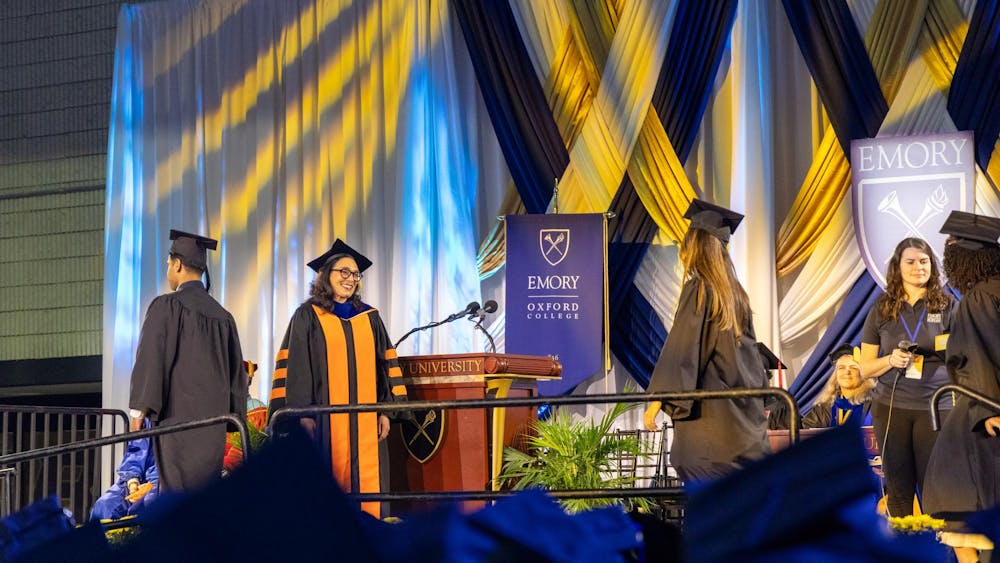Following a semester marked by a reinvigorated debate about academic freedom and the use of slurs in classrooms, the Emory University School of Law began the spring semester under a national spotlight.
The Emory Law Journal faced scrutiny from law professors nationwide after editors refused to publish an article by a California law professor that they determined to be “hurtful and unnecessarily divisive.”

Larry Alexander, Warren Distinguished Professor of Law at the University of San Diego, submitted an article to the publication in which he asserted that systemic racism does not exist.
After Alexander refused to remove parts of the piece that denied the existence of systemic racism the journal retracted its offer to publish the article.
The article, titled “Michael Perry and Disproportionate Racial Impact,” was supposed to be part of a collection honoring retiring Robert W. Woodruff Professor of Law Michael Perry, who specializes in constitutional law and human rights theory.
As is common for symposiums honoring a scholar, the publication invited legal scholars to submit articles that reflect on the scholar’s work, the law school told the Wheel. The process did not follow the journal’s typical selection process, which involves individuals submitting articles as opposed to being asked.
Alexander’s article argued against Perry’s renowned legal theory, Disproportionate Racial Impact, which is a framework to test if laws disproportionately benefit or harm one race even if they do not directly utilize race as a selection factor.
In refuting this theory, Alexander argued against the case for reparations and stated that wealth and educational gaps for Black people were not due to historic discrimination and segregation.
“Blacks as a group are doing better than ever before materially. And for those who are not doing well, the cause is not the effects of slavery or Jim Crow,” Alexander wrote in the article. “Nor is the cause racist bigotry, which, though some undoubtedly exists, is not a significant obstacle in blacks’ lives. Nor is it the vague culprit of ‘systemic racism.’”

In an interview with the Wheel, Alexander said he believes there is no “such thing as systemic racism,” and “challenged anyone to show exactly which system is racist.”
Perry declined to comment, indicating that it would not be constructive for him to comment on controversy that is supposed to be celebrating his career. Neither the journal’s Editor-in-Chief Danielle Goldstein (22B, 22L) nor Executive Articles Editor Shawn Ren (22L) responded to the Wheel’s requests for comment.
After the editors of the journal flagged Alexander’s piece to the executive board, Executive Symposium Editor Sami Harrell (22L) said they sent the piece back to Alexander with significant edits, altering language like his referral to Black people as “blacks.”
The largest edit removed the final section of Alexander’s three-part paper, which included his views on systemic racism.
“It was very inflammatory language and language that can't be supported academically,” Harrell said. “I found the article to be racist. I know that we had previously put out a statement of anti-racism, so I took issue with that.”
The journal’s board also criticized the lack of citations and scholarly merit, Harrell said.
Alexander said after he submitted the article, he received a memo from the editors stating that he could ignore suggested changes, so he did not acknowledge the edits.
But when Alexander sent his article back without changes, he received an email from the journal stating the executive board “unanimously stated they do not feel comfortable publishing this piece as written.” They said that while they believed there were “fair points of intellectual disagreement,” the piece would need to be revised heavily.
“We take issue with your conversation on systemic racism, finding your words hurtful and unnecessarily divisive,” the journal stated in the email to Alexander. “Additionally, there are various instances of insensitive language use throughout the essay … And, crucially, the discussion on racism is not strongly connected to your commentary on Professor Perry’s work.”
Alexander responded to the email reiterating his disagreement before communication ceased. His article will not be included in the publication, according to Harrell.
He believes members of the law review who did not support his argument and wanted to “censor” it.
“People don’t like to hear the kind of argument I was making,” Alexander said. “Sometimes when you say something that’s true, people don’t like to hear it.”
Harrell, however, said that while she does not agree with the points made in Alexander’s piece, she does not believe this is a free speech issue. Harrell also said that it is important for all members of the journal to feel comfortable with the content it publishes, stating, “It is the name of the ELJ ultimately attached to it.”
The law school, meanwhile, supported the journal’s decision.
“The editorial board’s requested changes were not intended to censor the author, but rather to ask that the author address concerns regarding the degree to which the submission met the quality and sourcing standards of the Journal and properly focused on the impact of Professor Perry’s scholarship,” the law school wrote to the Wheel. “The students carried out their responsibilities to ensure the high quality of the work published in the Journal in a professional manner.”
Criticisms of the Emory Law Journal
Shortly after the journal dropped Alexander’s article, two additional invitees — law professors Andrew Koppelman from Northwestern University (Ill.) and Steven Smith from the University of San Diego — retracted their articles from the journal in protest of the publication’s decision.
Two additional authors requested statements of protest to be attached to their submissions, which Harrell said will be included.

Smith, a colleague of Alexander who is also politically conservative, was the first to withdraw.
“This kind of censorship is becoming more common and is a very unfortunate development, so I didn’t really want to be part of something that was exercising that sort of censorship,” Smith said.
Koppelman, who is politically liberal, followed soon after. He said he initially hoped emailing the journal about his decision to rescind the article would cause the editors to “anticipate a cascade of protest and withdrawal and scandal” and change their minds. When that did not happen, Koppelman withdrew entirely.
“If nobody else pulled their article, then it would only be two conservative professors at San Diego who pulled their articles, and that would lead to this inaccurately being portrayed as a left-right conflict, which it shouldn't be,” Koppelman said. “For that reason, I thought that it would help to have somebody on the left who was joining them.”
Koppelman has disagreed with Alexander on several past occasions, and he disagreed with many arguments Alexander made in his article, such as his claim that people should oppose reparations for slavery. However, Koppelman said the issue was not political, as he was standing up for free speech and discourse.
“The view of the [journal] is that if something is hurtful, you ought not to say it, even if it's true, and even if knowing about it is important to address a pressing social problem.” Koppelman said. “I don't want law review editors who think like that. It mutilates our thought processes.”
Alexander said that while seeing Smith and Koppelman retract their articles in protest was “gratifying,” he believes they were supporting something much bigger than him — a principle of free academic inquiry and exchange.
“I hope I would do the same thing if the situation were reversed,” Alexander said.
Alexander, Smith and Koppelman’s articles will instead be published in the Journal of Contemporary Legal Issues at the University of San Diego.
Harrell said losing the articles written by the trio has not affected the journal’s publication time, and they are not seeking replacements. While Harrell disagrees with their sentiments, she said it was ultimately their decision to make.
“A decision to not publish is in itself a statement, an act of speech,” Harrell said.
Alexander said confronting uncomfortable arguments through free academic exchange is bigger than the journal.
“The sense of self righteousness and the refusal to confront alternative positions, I think that disease has spread far and wide,” Alexander said. “I don't know that this incident is going to be a cure for that.”
Supporting the Emory Law Journal
John Wilson, a 2019-20 fellow at the University of California National Center for Free Speech and Civic Engagement, also explained that while the student editors could have handled the situation a little better, their actions did not violate free speech.
“The obligation of an editor is to not just print anything they receive, but to engage in a process of editing,” Wilson said. “What the editors were doing was a pretty reasonable approach to what I thought was a very flawed article.”
Wilson contended that much of the critiques on the law journal focused less on editors’ actions than on the editors’ language — particularly critiquing Alexander’s article as “hurtful and unnecessarily divisive” about systemic racism not being real and containing “insensitive language” such as “blacks.”
“It did, I think, spark a lot of the suspicion that they had ulterior motives, that they were doing this for political reasons rather than for editorial reasons,” Wilson said.
However, Wilson added that the editors should not have told Alexander that he did not need to accept their revisions.
“There is no scholarly journal that should ever say, ‘Oh, you don’t have to change anything in an article, you can just print whatever you want,’” Wilson said.
Although Wilson understands why Alexander may have been frustrated in response to this incident, he noted that most professors who write for academic journals generally accept the majority of the edits they receive, especially “basic” requests such as more evidence and citations. Alexander, however, did not.
He also pointed out many flaws with the article itself, including a lack of scholarly language and writing mechanisms.
For instance, Alexander compared his opponents to Nazi Germany, which Wilson viewed as inappropriate for scholarly arguments. Alexander also neglected to use citations for his assertions that systemic racism no longer exists.
Alongside the journal’s editors, Wilson further contended that Alexander’s piece strayed too far from Perry’s body of work, presenting a major problem for a symposium on Perry.
“Professor Alexander had, in essence, taken a blog post he wrote earlier in 2021, attacking arguments for reparations, and threw it into this article meant to honor Professor Perry, even though Professor Perry never written about reparations, but simply because he had written about disparate racial impact theory 45 years ago,” Wilson said. “You don't have to agree with the professor or praise the professor, but you do have to stay on the topic of the professor.”
Because Alexander went off topic and provided “a very weak transition,” as well as the scholarly flaws to his piece, Wilson found it legitimate for the editors to refuse the piece.
“I don’t think the Emory Law Journal restricted anyone’s freedom to express themselves,” Wilson said. “They simply tried to do reasonable efforts at editing his work to improve his own essay, and he refused."

Madi Olivier (she/her) (25C) is from Highland Village, Texas, and is majoring in psychology and minoring in rhetoric, writing and information design. Outside of the Wheel, she is involved in psychology research, the Emory Brain Exercise Initiative and the Trevor Project. In her free time, you can find her trying not to fall while bouldering and obsessively listening to Hozier with her cat.






